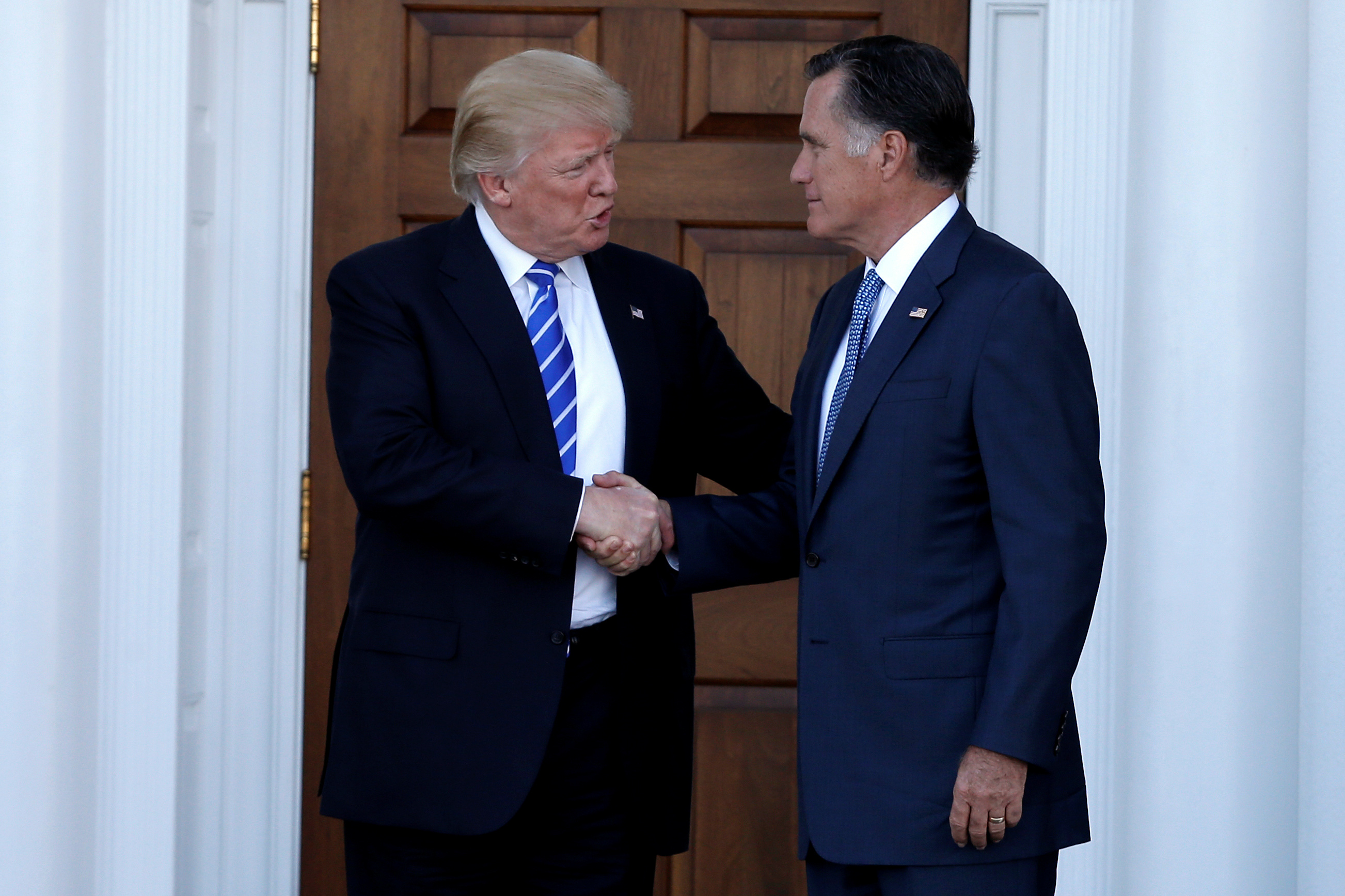5 ways the GOP is coping with Donald Trump
From total capitulation to restraint from within


A free daily email with the biggest news stories of the day – and the best features from TheWeek.com
You are now subscribed
Your newsletter sign-up was successful
Following the recent death of Cuban dictator Fidel Castro, conservatives were in a spasm of moral clarity. It felt like an old band rehashing its greatest hits as they issued thundering condemnations of the communist island regime and Castro's many euphemism-laden obituaries in the American press, as well as the embarrassing whitewashing statements from world leaders like Canada's Justin Trudeau.
Then the reality of America's would-be autocrat and conspiracy-theorist-in-chief Donald Trump reasserted itself, in a series of bizarre tweets in which the president-elect alleged that he would have won the popular vote if not for widespread voter fraud, followed two days later by the suggestion that flag burners should be jailed and lose their citizenship.
Castro is dead. Trump lives.
The Week
Escape your echo chamber. Get the facts behind the news, plus analysis from multiple perspectives.

Sign up for The Week's Free Newsletters
From our morning news briefing to a weekly Good News Newsletter, get the best of The Week delivered directly to your inbox.
From our morning news briefing to a weekly Good News Newsletter, get the best of The Week delivered directly to your inbox.
Conservatives have adapted to this uncertain reality in a variety of ways. Here are five of their core strategies.
1. The Steve Moore method: Total capitulation
As recently as August 2015, Moore (along with fellow supply-side fanatic Larry Kudlow) warned that Trump was a neo-Herbert Hoover who would sever the party from its Reaganite free-trade roots. Now the Club for Growth founder is reportedly telling Republican lawmakers that the party no longer belongs to Reagan. "Just as Reagan converted the GOP into a conservative party, Trump has converted the GOP in a populist working-class party," he said.
The Moore method posits that Trump has dramatically changed the Republican Party. Everyone needs to adjust accordingly.
A free daily email with the biggest news stories of the day – and the best features from TheWeek.com
The good news for monomaniacs like Moore (who is now one of the president-elect's top economic advisers) is that Trump, supposed avatar of working-class populism, may very well sign into law a gigantic tax cut for the top 0.1 percent, despite a campaign premised on confronting Wall Street elites and lifting up the "forgotten man and woman."
Capitulation, apparently, is not without its ideological satisfactions.
2. The Mike Lee method: Truth in labeling
Throughout the campaign, the junior senator from Utah unflinchingly opposed Trump. Now he proposes a detente of sorts: a partnership to decentralize power under the banner of "principled populism." Lee's proposal is essentially a rebranding effort to exploit Trump's native talent for identifying sources of unrest. The solutions, meanwhile, will look like what Lee and fellow reformicons have recommended all along.
"The rough terms of a successful partnership seem obvious," Lee wrote in National Review. "Populism identifies the problems; conservatism develops the solutions; and President Trump oversees the process with a veto pen that keeps everyone honest. Call it 'principled populism': an authentic conservatism focused on solving the problems that face working Americans in a fracturing society and globalizing economy."
The Lee method is, tactically speaking, very much worth trying. But it remains to be seen whether the Trump White House, with its many competing voices, will consent to the outsourcing of its policy agenda to a cadre of conservative wonks who have kept Trump at arm's length if they haven't shunned him entirely.
3. The Marco Rubio/Ted Cruz method: Business as usual
This could be named for almost any other prominent Republican. Yet none captures the arc of resistance to resignation as neatly as erstwhile rivals Rubio and Cruz. During the GOP presidential primaries, Rubio called Trump a "con artist" who, if not for inherited wealth, would be selling watches on the streets of Manhattan. Cruz called Trump "utterly amoral." The pair also, at Sen. Lee's urging, explored the possibility of a unity ticket to take Trump down. At some point, however, both made their peace and endorsed their party's nominee. Not even the revelation that he was an alleged serial molester of women could dislodge them from supporting the embattled Trump.
How alarmed is Rubio, probably the most hawkish of the 17 Republican presidential candidates, by Trump's connections to the Putin regime? How does Cruz really feel about Trump spouting conspiracy theories originating from Infowars with the same abject disregard for truth that he accused Cruz's father of involvement in the JFK assassination?
No one knows. Like most other key Republicans, Rubio and Cruz have largely conducted themselves as though the election of Trump was a move-along, nothing-to-see-here event.
4. The institutionalist's method: Restraint from without
Throughout the Obama years, perceptive thinkers on the right such as Yuval Levin have warned against the erosion of Congress' lawmaking prerogatives — an extraconstitutional habit of policymaking that has taken root in both Republican and Democratic administrations.
The institutionalist sees the rise of Trump — an outsider who hijacked one party to defeat the other — as a grand opportunity for both the left and right to restore Congress' constitutional authority. The Hudson Institute's Christopher DeMuth writes in the Wall Street Journal: "Under the circumstances, Congress is bound to recover and assert many of its long-neglected legislative prerogatives."
To realize this potential restoration, conservatives may find themselves in the position of sacrificing ends for means — of not doing what they believe is the right thing unless it's done the right way.
For the sake of the long-term health of both parties, here's hoping DeMuth is right.
5. The Mitt Romney method: Restraint from within
The former Massachusetts governor and 2012 GOP presidential nominee has been left in reality-show-like limbo as he awaits news of Trump's choice of secretary of state. We're not privy to the conversations Trump has had with Romney since winning the presidency, but we know this much: Romney has not recanted his denunciation of Trump and, indeed, added the specter of "trickle-down racism" to his critique of Trumpism after the election took place.
Romney's seeming independence reportedly has Trump insiders worried that he would preside over a "rogue agency" within the administration.
Mitt Romney, an uncommonly decent man, would be the least likely "rogue" in the history of American politics. But such is the reality of living through a rogue presidency.
Scott Galupo is a freelance writer living in Virginia. In addition to The Week, he blogs for U.S. News and reviews live music for The Washington Post. He was formerly a senior contributor to the American Conservative and staff writer for The Washington Times. He was also an aide to Rep. John Boehner. He lives with his wife and two children and writes about politics to support his guitar habit.
-
 Why is the Trump administration talking about ‘Western civilization’?
Why is the Trump administration talking about ‘Western civilization’?Talking Points Rubio says Europe, US bonded by religion and ancestry
-
 Quentin Deranque: a student’s death energizes the French far right
Quentin Deranque: a student’s death energizes the French far rightIN THE SPOTLIGHT Reactions to the violent killing of an ultraconservative activist offer a glimpse at the culture wars roiling France ahead of next year’s elections
-
 Secured vs. unsecured loans: how do they differ and which is better?
Secured vs. unsecured loans: how do they differ and which is better?the explainer They are distinguished by the level of risk and the inclusion of collateral
-
 The billionaires’ wealth tax: a catastrophe for California?
The billionaires’ wealth tax: a catastrophe for California?Talking Point Peter Thiel and Larry Page preparing to change state residency
-
 Bari Weiss’ ‘60 Minutes’ scandal is about more than one report
Bari Weiss’ ‘60 Minutes’ scandal is about more than one reportIN THE SPOTLIGHT By blocking an approved segment on a controversial prison holding US deportees in El Salvador, the editor-in-chief of CBS News has become the main story
-
 Has Zohran Mamdani shown the Democrats how to win again?
Has Zohran Mamdani shown the Democrats how to win again?Today’s Big Question New York City mayoral election touted as victory for left-wing populists but moderate centrist wins elsewhere present more complex path for Democratic Party
-
 Millions turn out for anti-Trump ‘No Kings’ rallies
Millions turn out for anti-Trump ‘No Kings’ ralliesSpeed Read An estimated 7 million people participated, 2 million more than at the first ‘No Kings’ protest in June
-
 Ghislaine Maxwell: angling for a Trump pardon
Ghislaine Maxwell: angling for a Trump pardonTalking Point Convicted sex trafficker's testimony could shed new light on president's links to Jeffrey Epstein
-
 The last words and final moments of 40 presidents
The last words and final moments of 40 presidentsThe Explainer Some are eloquent quotes worthy of the holders of the highest office in the nation, and others... aren't
-
 The JFK files: the truth at last?
The JFK files: the truth at last?In The Spotlight More than 64,000 previously classified documents relating the 1963 assassination of John F. Kennedy have been released by the Trump administration
-
 'Seriously, not literally': how should the world take Donald Trump?
'Seriously, not literally': how should the world take Donald Trump?Today's big question White House rhetoric and reality look likely to become increasingly blurred
